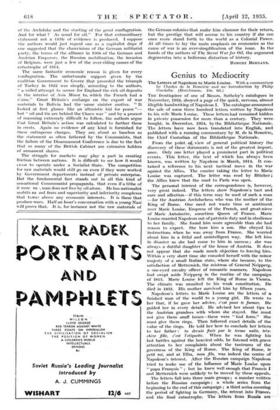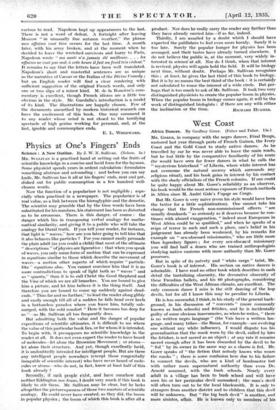Genius to Mediocrity
The Letters of Napoleon to Marie LOuise. With a commentary by Charles de la Ronciere• and- an- Introduction by Philip Guedalla: (Hutchinson. 10s. Oci.) TILE frontispiece of one of Messrs. Sotheby's catalogues in November, 1934, showed a.page of the quick, nervous, almost illegible handwriting of Napoleon I. The catalogue announced
the sale of some three hundred letters written by Napoleon to his wife Marie Louise. These letters had remained hidden in private possession for more than a century. They were bought, in December, 1934, by the Bibliotheque Nationale.
The „letters- have now been - translated into English, and published with a running commentary by M. de la Roneiere, the Chief Custodian Of the Bibliotheque Nationale.
From the point view of general political history the
discovery of these documents, is not of the greatest import-
ance. Only one letter played a prominent part in political events. This letter, the text of which has always been known, was written by Napoleon in March, 1814. It con- tained a reference to his next tactical move in the war against the Allies. The courier taking the letter to Marie Louise was captured. The letter was read by Blucher ; the Allies knew that the road to Paris was open.
The personal interest of the correspondence is, however, very great indeed. The letters show Napoleon's tact and care and affection—if this term may be used of such a man —for the Austrian Archduchess who was the mother of the King of Rome. One- need not waste time or sentiment over Marie Louise, Empress of the French, and great-niece of Marie Antoinette, sometime Queen of France. Marie Louise married Napoleon out of patriotic duty and in obedience to her family. She found him more agreeable than she had reason to expect. She bore him a son. She obeyed his instructions when he was away from France. She worried about him in a fitful and unintelligent way. She left him in disaster as she had come to him in success ; she was always a dutiful daughter of the house of Austria. It does not appear that she made much objection to leaving him. Within a very short time she consoled herself with the minor majesty of a small Italian state, where she became, to the satisfaction of Metternich, the mistress of General Neipperg, a one-eyed cavalry officer of romantic manners. Napoleon had swept aside Neipperg in the routine of the campaign of 1813. Marie Louise left the King of Rome in Vienna. The climate was unsuited to his weak constitution. He died in 1832. His mother survived him by fifteen years.
Napoleon's letters to Marie Louise are the letters of a finished man of the world to a young girl. He wrote to her that, if he -gave her- advice, c'est pour to former. He guided her in every detail. He advised her about tips to the Austrian grandees with whom she stayed. She must not give them snuff boxes—these were " bad form." She must give them rings. Then followed exact details of the value of rings. He told her how to conclude her letters to her father : tzc derais firir par le terme usite, tres- chhe fille, c'est retiquette. When he was fighting his last battles against the heaviest odds, he listened with grave attention to her complaints about the tantrums of the governess of the King of Rome. The King of Rome, le petit roi, and at Elba, mon fils, was indeed the centre of Napoleon's interest. After the Russian campaign Napoleon tried to Make- use of the influence of Marie Louise upon " papa Francois " ; but he knew well enough that Francis I and Metternich were unlikely to be moved by these appeals.
The letters fall into three main groups ; a number written before the Russian campaign ; a whole series from the beginning to the end of this campaign ; a third series covering the period of fighting in Germany, the retreat into France, and the final- catastrophe. The letters frein Russia are- curious to read. Napoleon kept up appearances to the last. There is not a word of defeat. A fortnight after leaving Moscow " in unusually fine autumn weather," the phrase uses affaires vont bien occurs for the last time. A month later, with his army broken, and at the moment when he decided to leave the wretched survivors and hurry to Paris, Napoleon wrote " ma sante n'a jamais etc tneilleure. . . . les affaires ne vont pas mal, a Bette heure it fait un froid Iris violent." It remains to say that the letters have been well translated. Napoleon's short and masterful sentences are as unique as the narrative of Caesar or the Italian of the Divine Comedy ; but an English reader will find a clear rendering with sufficient suggestion of the original French words, and only one or two slips of a minor kind. M. de la Ronciere's com- mentary is excellent, though French idioms are a little too obvious in the style. Mr. Guedalla's introduction is a model of its kind. The illustrations are happily chosen. Few of
the documents unearthed by modern historical research can have the excitement of this book. One may commend it to any reader whose mind is not closed to the terrifying spectacle of high genius working for personal, and, at the last, ignoble and commonplace ends.
E. L. WOODWARD.



















































 Previous page
Previous page